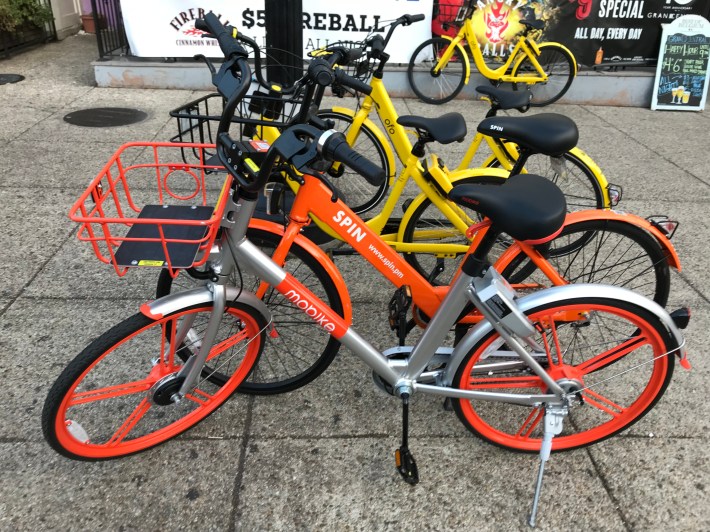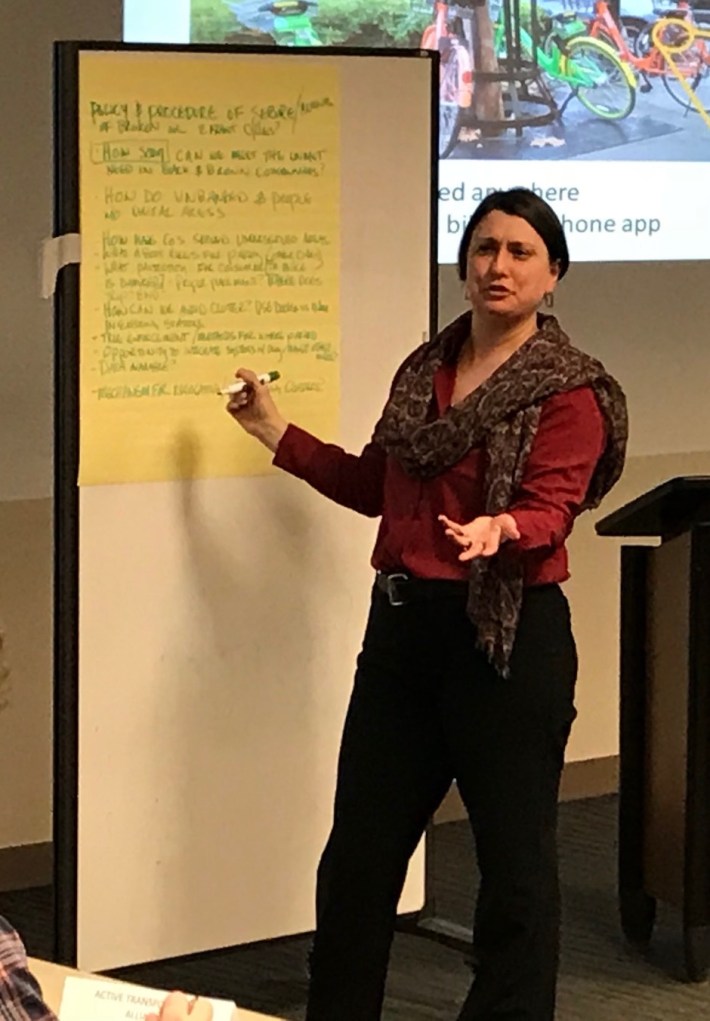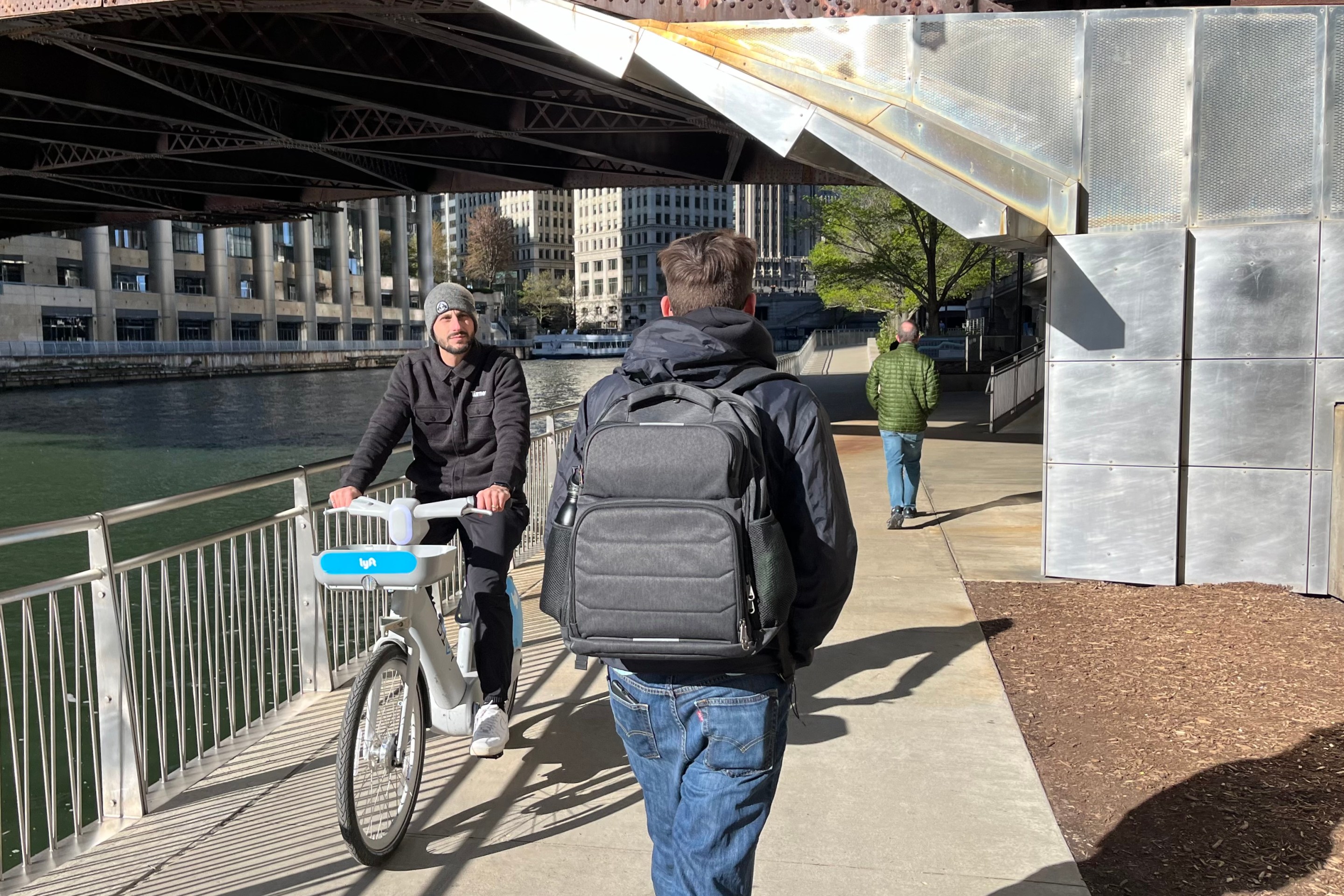Cyclists Voice Their Hopes, Concerns, and Questions About Dockless Bike-Share
4:22 PM CST on December 19, 2017

A Jump Mobility dockless cycle on the Lakefront Trail last week. Photo: John Greenfield
As the debate rages on about whether dockless bike-share technology would do more good or harm for Chicago, last week city transportation officials asked cyclists what questions they should ask potential vendors at an upcoming info session.
Dockless bike-share, aka DoBi (“Dough Bee”), typically involves cycles with built-in wheel locks that are left “free-locked” around a city for customers to locate and access via a smartphone app, generally for $1 per half hour. Proponents say this represents the future of bike-sharing, which could help bring public bikes to outlying Chicago neighborhoods that probably won’t be getting Divvy stations anytime soon. Others argue that it’s a lower-quality form of bike-share, with artificially low rates propped up by venture capital, that would cause street clutter and cannibalize Divvy ridership.
At last week’s Mayor’s Bicycle Advisory Council meeting, Chicago Department of Transportation deputy commissioner Sean Wiedel, who oversees the Divvy program, said that the city hopes to install 40 new stations this spring, bringing the total to 620, with about 6,200 bikes. Pending final approval from the Illinois Department of Transportation and local aldermen, the new docks will be used to add stations downtown and in underserved communities where low station density currently makes the system less useful. He also gave a shout-out to former Divvy general manager Elliot Greenberger, who is moving to LA to work for Lyft, and has been replaced by Michael Critzon.
Next Wiedel addressed the DoBi issue, reiterating what he said at last month’s Mayor’s Pedestrian Advisory Council meeting, that the city doesn’t yet have a position on the technology. He added that, along with CDOT, the mayor’s office, the law department, and the department of Business Affairs and Consumer Protection will have input on policy decisions. Wiedel said the city plans to invite dockless vendors to present their proposed business models and ideas in the next month or so and use that info to inform future city policy.

Next, rather than answer questions about DoBi from MBAC attendees, Wiedel and CDOT's Divvy program manager Amanda Woodall asked those present to recommend questions that the city should ask the companies, which Woodall wrote down on a large piece of paper.
One person wondered what the rules would be about the city seizing bikes parked in locations where they pose a hazard, or broken cycles. According to Tom Fucoloro from Seattle Bike Blog, when DoBi cycles are left lying on sidewalks or blocking crosswalks in Seattle, which has several thousand of dockless bikes, they’re usually moved promptly by passers-by.
Oboi Reed, leader of the new mobility justice organization Equiticity, which is establishing bike libraries on the South and West Sides with cycles provided by DoBi companies, implied that Chicago should allow the technology to come to town as soon as possible. “The question I would ask is how soon are y’all able to bring bikes to our city to address the unmet need for Black and Brown people to have bikes in their neighborhoods, given the public resource nature of bike-share in our city and the potential for increased bike mode share in our neighborhoods to improve health, create jobs, and reduce violence, which research shows happens when bike mode share increases in a neighborhood,” Reed said. “So what I want to know is are y’all able to come tomorrow? Next month? Next year?”

Bike-focused attorney Brendan Kevenides (a Streetsblog sponsor) asked how people without smartphones or credit cards can access DoBi cycles. Some companies provide subsidized rides for low-income people, who can use RIFD cards or pass codes to unlock the bikes.
Longtime bike advocate Kathy Schubert (whose campaign against dangerous metal-grate bridges was the reason the bike-friendly anti-skid plates on the spans are nicknamed “Kathy plates”) asked for a show of hands of how many people “don’t think [dockless] would ever work in Chicago.” About half of the MBAC attendees raised their hands.
Lakeview resident Allan Mellis wanted to know what plans DoBi companies have to bring the technology to underserved neighborhood, rather than simply focusing on profitable high-demand parts of town. He was also curious about what the rules for parking the bikes would be. “That would be up to us to decide,” Wiedel said.
Major Taylor Cycling Club of Chicago president Peter Taylor asked what liability protections there would be for dockless bike-share customers, for example if a cycle that they had checked out and parked properly later fell down and someone tripped over it.
An attendee who had recently experienced DoBi in Shanghai said he found the bikes to be “futuristic and wonderful,” but was curious about enforcement of dockless parking rules. “I use the analogy of pet waste,” he said. “We have rules against it and yet there's a lot of pet waste on the sidewalk. How do we make sure it’s enforced rather than simply having another rule on the books?”

Sharon Feigon, head of the Shared Use Mobility Center, was curious about opportunities to integrate different DoBi services with Divvy and transit, and to get ridership data from the companies.
Technical writer Trina Grieshaber asked whether the dockless bikes would be available in different sizes to accommodate shorter riders. While I’ve seen a 4’10’’ friend ride a Divvy ape hanger-style, the cycles also work (just barely) for rangy Streetsblog writer Steven Vance. In contrast, the DoBi cycles I’ve ridden seem like they might not work well for people much over six feet. Grieshaber also wondered if there are any safeguards to keep DoBi users from bringing the relatively light bikes into their homes and keeping them there until they’re ready to take another ride.
Dan Black from the bike equity group Slow Roll Chicago asked whether dockless providers who operate in neighborhoods without Divvy stations will be required to hire local residents to “rebalance” and maintain the bikes. Spin, one of the DoBi companies that has been courting Chicago, has been in talks with the bike education center West Town Bikes about hiring youth from communities of color to service a future fleet.
Finally someone asked, “To what extent will a new dockless bike-share program compliment or compete with existing bike-share programs?” Wiedel replied. “Well, that’s a perfect question to end our discussion, and it’s one that’s on the top of our minds, absolutely.”
In addition to editing Streetsblog Chicago, John writes about transportation and other topics for additional local publications. A Chicagoan since 1989, he enjoys exploring the city on foot, bike, bus, and 'L' train.
Stay in touch
Sign up for our free newsletter
More from Streetsblog Chicago
Johnson appoints one West Side pastor to CTA board, then nominates another West Side pastor for RTA board
Supporters argue that, despite his lack of transit expertise, Ira Acree’s social justice experience and political connections could be an asset for the RTA board.
Today’s Headlines for Thursday, April 26
The de-facto ban on riverwalk biking is back. What should we do about it?
In the short term, new signage is needed to designate legal areas for cycling on the path. In the long term CDOT should build the proposed Wacker Drive protected bike lane.


